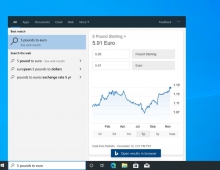
Bing Gets More Personal
Microsoft is trying to make Bing search engine more personalized for users as the company is testing a raft of experiments to see which techniques deliver the best results for a given user behavior.
As a first step, Bing's search results will be automatically tailored based on a user's physical location.
Microsoft said that 76% of people use search engines to plan trips, events or social gatherings. Bing Local has always provided users with maps to nearby business listings, are views and areas of interest. Starting today, Microsoft is going a step further with new improvements that take into account where users are and serve locally relevant information directly in the body of the results page.
For example, if you wanted the websites of Seattle pizza joints I might try "Pizza in Seattle." Today, you can simply type "Pizza" and Bing will immediately recognize where you are, in this case Seattle, and provide a link to a popular local pizza place directly in the results.
Such features have been already adopted by Bing's rival Google in its popular search engine.
Bing is also introducing a feature that helps Bing present the most relevant website based on an individual's previous searches.
Microsoft said that about 30% of queries are "navigational" queries - meaning a user is trying to find a particular website like Facebook, Expedia, or the New York Hilton. Now, if a user issues a query such as {acs} the most relevant result for that user is not necessarily the same as that for the majority of people in the U.S. To numerous users with an interest in pursuing a career in chemistry, the most relevant result may be the American Chemical Society, but to someone interested in how they can get involved in the fight against cancer, the most relevant result is more likely to be the American Cancer Society.
Suppose, in this latter case, the chemistry fan selects American Chemical Society. Microsoft's research shows that users commonly re-issue such navigational queries and the intent of that user rarely changes. This new personal search feature uses this human behavior as its core premise - if Bing thinks a user is trying to "re-find" a site, the relevant result is promoted to the top position on the page.
The new features are currrently available for U.S.-based visitors of Bing.
Microsoft said that 76% of people use search engines to plan trips, events or social gatherings. Bing Local has always provided users with maps to nearby business listings, are views and areas of interest. Starting today, Microsoft is going a step further with new improvements that take into account where users are and serve locally relevant information directly in the body of the results page.
For example, if you wanted the websites of Seattle pizza joints I might try "Pizza in Seattle." Today, you can simply type "Pizza" and Bing will immediately recognize where you are, in this case Seattle, and provide a link to a popular local pizza place directly in the results.
Such features have been already adopted by Bing's rival Google in its popular search engine.
Bing is also introducing a feature that helps Bing present the most relevant website based on an individual's previous searches.
Microsoft said that about 30% of queries are "navigational" queries - meaning a user is trying to find a particular website like Facebook, Expedia, or the New York Hilton. Now, if a user issues a query such as {acs} the most relevant result for that user is not necessarily the same as that for the majority of people in the U.S. To numerous users with an interest in pursuing a career in chemistry, the most relevant result may be the American Chemical Society, but to someone interested in how they can get involved in the fight against cancer, the most relevant result is more likely to be the American Cancer Society.
Suppose, in this latter case, the chemistry fan selects American Chemical Society. Microsoft's research shows that users commonly re-issue such navigational queries and the intent of that user rarely changes. This new personal search feature uses this human behavior as its core premise - if Bing thinks a user is trying to "re-find" a site, the relevant result is promoted to the top position on the page.
The new features are currrently available for U.S.-based visitors of Bing.





















